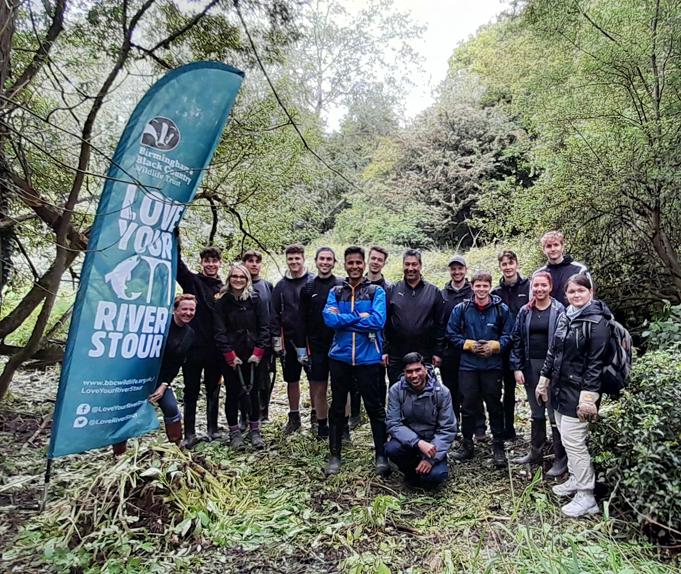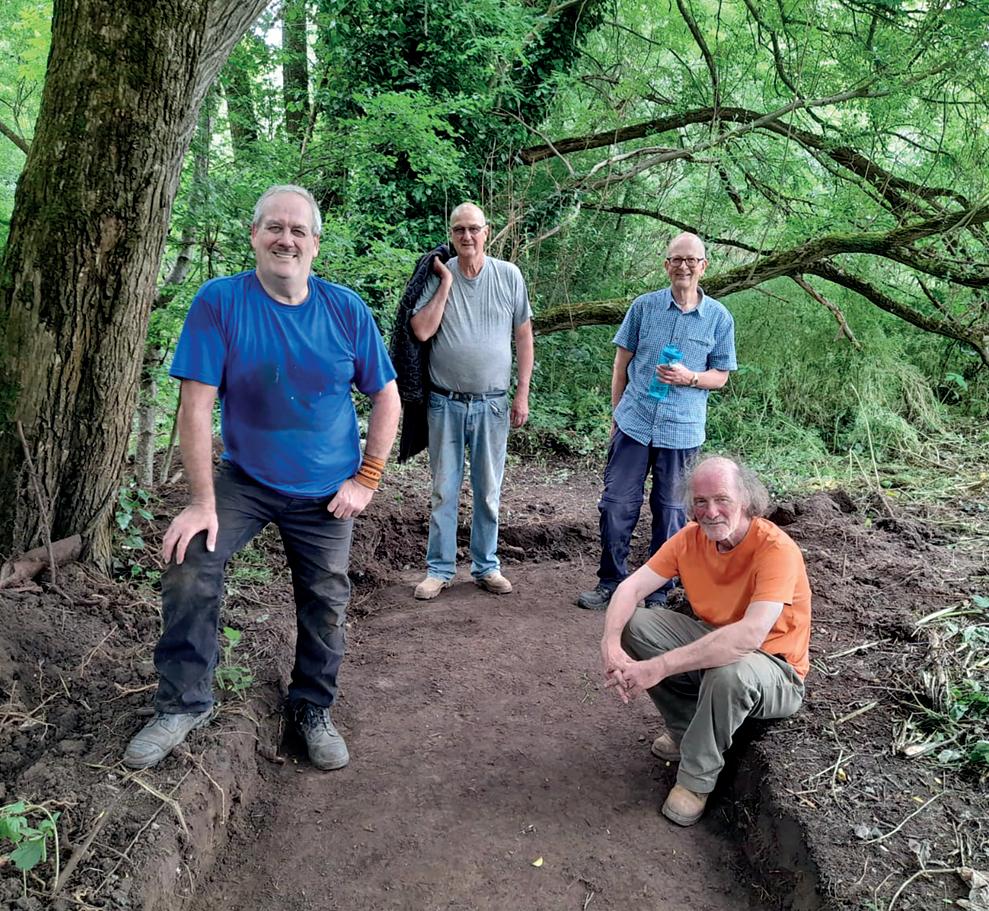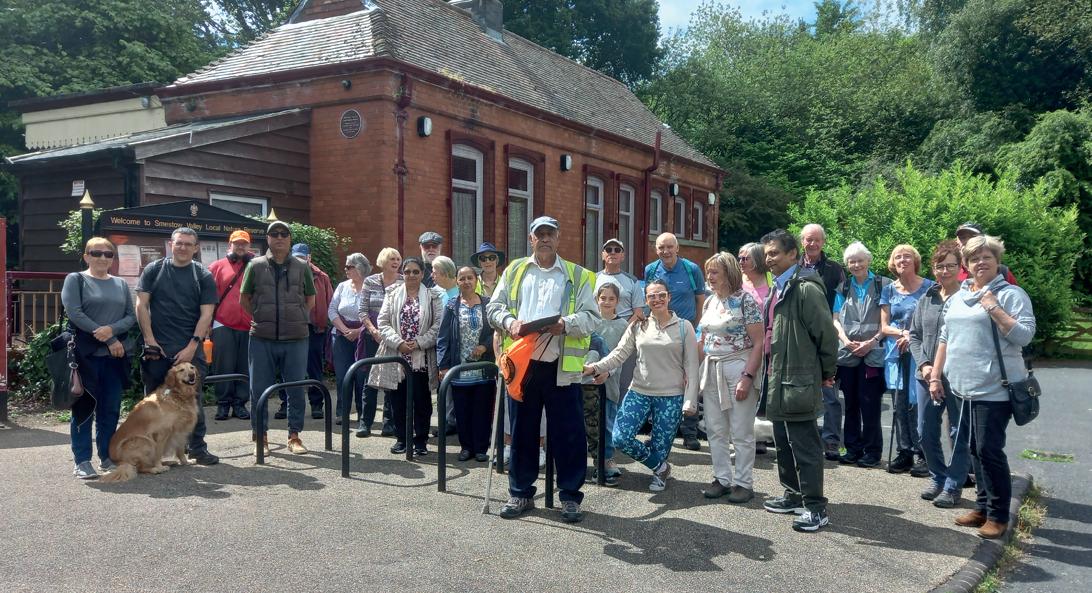
5 minute read
Love Your River Stour
Project update
BY SALLY CLAGUE , SENIOR RIVER RESTORATION OFFICER
Advertisement

Our Love Your River Stour (LYRS) Project has been active on the on the ground for almost a year with lots of activity taking place and more planned for the next few months.
This phase of the project, funded by the Green Recovery Challenge
Fund, runs up to spring 2023 and focuses on project sites in
Wolverhampton and Dudley. We are working in partnership with the Environment Agency to improve the condition of the River Stour wildlife corridor, including tributaries of the River such as the Smestow Brook, to create and enhance habitats that support a wide diversity of wildlife and flora. As well as increasing biodiversity, the project aims to increase engagement with the river and local green spaces by encouraging local communities to take action to protect it for the future. This includes generating awareness of how even small everyday changes, such as washing cars on gravel or grass, can contribute to improving the condition of the river.
River corridor restoration
Four sites have been the focus for habitat improvement works within the Black Country; Stambermill and Riverside House in Stourbridge, Seth Somers Park in Halesowen and Smestow Valley Local Nature Reserve (LNR) in Wolverhampton. Our dedicated volunteers have supported many elements of these activities at our weekly volunteer days at both Stambermill and Smestow Valley LNR. Throughout the spring and summer, we have been busy clearing pathways, preparing for and spreading green hay, sowing additional wildflower seeds,, clearing bramble and scrub, splitting and spreading existing flora, monitoring aquatic invertebrates and much more! Several years’ worth of silt had buried the pathway at Stambermill, making it treacherous to walk alongside the river through the site. After several sessions and lots of hard work by the volunteers, the pathway is now visible and accessible allowing local residents to explore the site and reconnect with the river.
One of the most enjoyable habitat improvements so far has been the meadow creation and improvement. The grasslands that already existed on the project sites were low in species diversity or had become densely overgrown with bramble. We prepared the sites by digging out the bramble or
cutting and removal of the grass and scarifying the ground to increase seed to soil contact and thus increase the likelihood of successful germination and our volunteers strewed the donor hay, collected from Illey Pastures SSSI in Halesowen. We look forward to seeing the results of these efforts over the next few years when the seed strewn has produced diverse grasslands teeming with a wide variety of wildlife. Whilst our volunteers have been working hard, we have also had several Wild Experience Day bookings with employees from businesses helping us on these projects. Attendees have removed invasive Himalayan balsam from the riverbank, cleared new pathways, begun excavations on a new pond and removed invasive species from a woodland. Moving into winter our focus moves onto tree works; we will be thinning woodland areas to allow increased light to reach the woodland floor allowing plants such as bluebell, woodruff, ransoms, primroses and many others to thrive. This activity also enables the introduction of tree species that are missing from the woods, especially species such as rowan, alder buckthorn and guelder rose, all of which provide flowers and fruit, which are beneficial for pollinators and birds. All the species for planting are chosen carefully to reflect those that would be found naturally in the local region to reduce the risk of bringing invasive species or diseases to the area. We also carefully record what has been planted for clarity in the future on what occurred naturally and what was provided as enhancement. With help from contractors, we will be creating wetland and ponds across all four of the project sites to provide habitats that either do not occur, or occur infrequently, across the site. Adding these niche habitats helps to support a more diverse range of flora and fauna that is perhaps more rare in the area, as well as providing a stepping-stone between other wetland areas creating more connectivity throughout the landscape. Connectivity is key as climate change increases the temperatures; if habitats are not well connected, wildlife cannot move to new areas to find climates that are more suitable. These wetland features will help to provide safe havens for wildlife.
Community Engagement

Helping more people to engage with and learn about the project is key to the legacy of this project, ensuring that the river and the project sites are looked after and appreciated long into the future.
We’ve had a busy summer and you may have seen us along with Sir David Ottenborough, our friendly mascot, at several events including the International Festival of Glass at Riverside House in Stourbridge or the City Nature Challenge Event in Smestow Valley LNR. We have led guided walks at several of the project sites as well as hosting family friendly activities. We’ve also been working closely with local college students who are supporting us by undertaking surveys and practical management sessions. Alongside our community engagement activities, we are also offering workshops and training courses. We are visiting local primary schools, delivering our Stour Rangers workshops to children, helping them to learn about the water system, pollutants and the wildlife that lives on the river. Our Open College Network accredited Level 1 qualification in tools use is open to young people looking to start a career in the environmental sector and a great opportunity to learn practical skills.
Get involved
Events
For details of all upcoming events visit bbcwildlife.org.uk/events or email LYRS@bbcwildlife.org.uk
Survey
Help us understand your views about the River Stour and its tributaries for the chance to win a goody bag worth £45! The survey closes in December so to have your say, visit bbcwildlife.org.uk/LoveYourRiverStour and click the link to the survey
Social Media
Follow the Love Your River Stour project on Facebook @LoveYourRiverStour or Twitter @LoveRiverStour
Volunteer
Join our weekly volunteer sessions to help us improve more river habitats. Find out more and register as a volunteer at bbcwildlife.org.uk/volunteer
Fundraise while you shop
Select us as your cause through your Co-op membership and raise money for the Love Your River Stour project every time you shop. Visit membership.coop.co.uk/causes/73567









